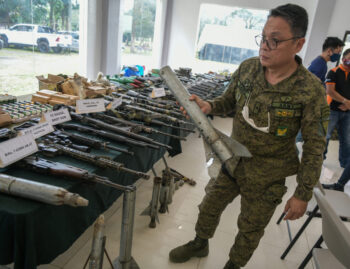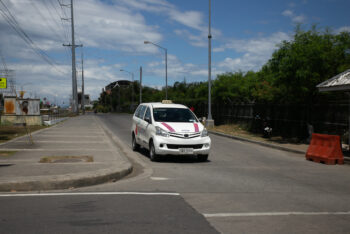NAAWAN, Misamis Oriental (MindaNews / 9 Nov) – It’s high time the government bans the production and use of thin, flexible plastics bags or such other packaging items for dry and wet goods; plastic bottles as disposable or one-use container for the commerce of water and soda; and Styrofoam materials used as plates or food holders. These plastic items, along with other solid wastes, primarily clog drainage and sewerage systems that have caused damaging and costly flash floods in many urban centres.
Moreover, these plastics have become public eyesore and have degraded the beauty and integrity of the environment. They have littered our rivers and beaches and undermine the ecosystem. They become embedded in estuaries and alter adversely the habitat, the food production system and apparently the population of shells, snails, shrimps, and other bottom dwelling fauna. Thin and flexible plastic bags smother and kill the saplings and the young mangroves.
Even the forests are not spared from the ugly invasion of plastics. Plastic bottles are strewn under trees and thin plastic bags and wrappers are plastered in branches and twigs of trees by wind action. The plastics in the forest may yet cause forest fires.
Plastic has become a vital part of our lives of convenience. Relatively strong, light and malleable, plastic has been used in all imaginable construction and fabrication activity replacing in parts many metals, cement, wood, plant-based fiber, and glass. It is in replacing fibers and glass as packaging and holding items for wet and dry goods that plastic has become a bane to humans and the environment. Our convenient way of life somehow developed in us an unsentimental throwaway culture such that water and soda bottles, cups and bags we only use once are irresponsibly and easily disposed, ending up in drainage canals, creeks, rivers and eventually in the ocean.
Mountains of plastic trash of all kinds are floating in the oceans. In our own backyard, even the most isolated islands of the Sulu archipelago are littered with plastic bottles and other plastic flotsams.
CNN showed a documentary of an island in Midway that has become the ultimate landing destination of apparently all plastic wastes of countries along the Pacific coasts. The island stinks of the rotting carcasses of its bird inhabitants, the albatross. The researchers who examined the carcasses of the birds found in the stomachs undigested small plastic shards and items like bottle and toothpaste caps, even lighters and pieces of Styrofoam debris that the birds have taken in mistaking likely as natural feeds.
According to the Ellen MacAthur Foundation, nearly every piece of plastic ever made still exists today. More than five trillion pieces of plastic are already in the oceans, and by 2050 there will be more plastic by weight in the sea than fish.
Some 8 million tons of plastic trash leak into the oceans annually, and it’s getting worse every year. Americans are said to use 2.5 million plastic bottles every hour of which a good percentage will ultimately find its way into the sea.
Marine scientists of the National Oceanic and Atmospheric Administration (NOAA) posit that by actions of the various forces in the oceans, plastics slowly disintegrate into fine nano pieces that sink in the ocean bottoms and end up in planktons, the primary producer in the ocean food chain. The nanoplastics are ingested by fishes that fed on planktons, and are ultimately eaten by humans.
There’s growing evidence that plastic is harmful to humans. The US government says styrene – one of the key ingredients in plastic – is probably a human carcinogen. It is studying the effects of plastic litter on marine life and plans to launch an inquiry into the effects on human health, including fetal formation.
The Philippines is reported as among the top five countries in Asia that heavily contribute to the mounting plastic pollution of the Pacific. If only to show our remorse in action and our concern to save our oceans and the future human generations, it is high time that our government regulates soonest possible the production and use of plastics.
It is heartening to note that already some 30 local government units, mostly cities and municipalities in Luzon, have regulated the sales of plastics as packaging materials for wet and dry goods. If the national government bans the production and regulates the use of said plastic items nationwide, the scale of compliance and protection of our environment will be multiplied and may yet reduce our ignominious share to the plastic pollution of the Pacific.
(MindaViews is the opinion section of MindaNews. William R. Adan, Ph.D., is retired professor and former chancellor of Mindanao State University at Naawan, Misamis Oriental.)







